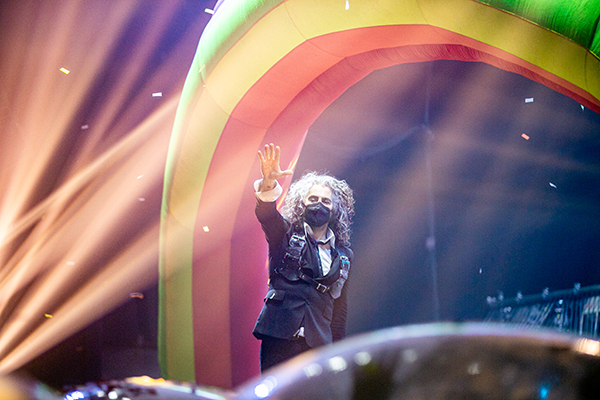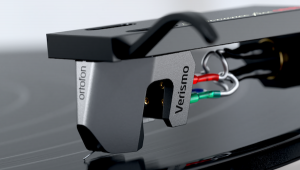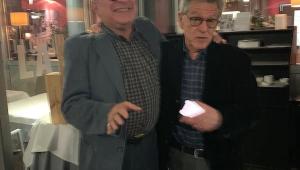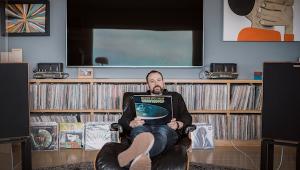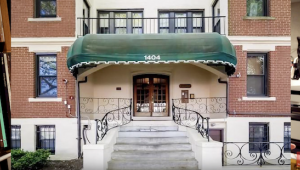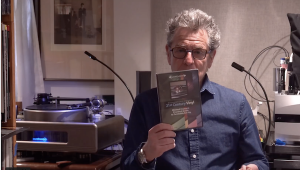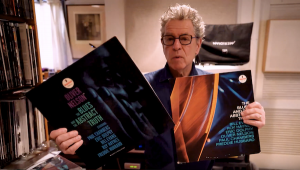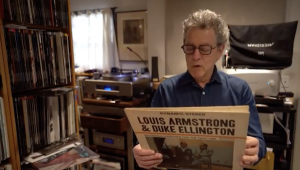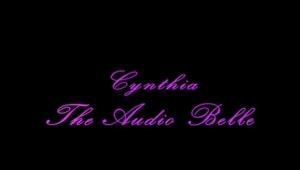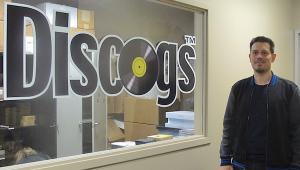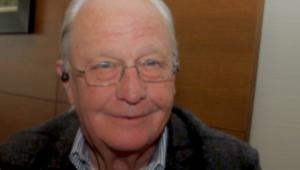Wayne Coyne of The Flaming Lips Realizes the Magic of Listening Is Found on Vinyl, and He Reveals How His Band’s New Yoshimi Battles the Pink Robots 180g 5LP Box Set Takes You There
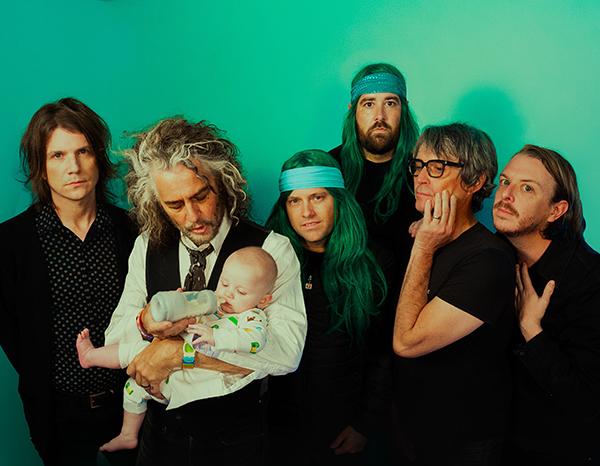
All Lips/band photos in this story by Blake Studdard.
The Flaming Lips are one of those bands that have always endeavored to create their own sonic universe, and we almost never know exactly what planet we’ll be on when we drop the needle on their latest vinyl venture and/or most recent archival collection.
Case in point — when we enter The Wayback Machine and turn the clock back to July 2002’s Yoshimi Battles the Pink Robots, we recall being blessed with an even-trippier followup to The Lips’ mind-expanding May 1999 breakthrough, The Soft Bulletin. Yoshimi catapulted The Flaming Lips into a new public consciousness stratosphere that the Oklahoma-based alt/space-rock collective has been mining, refining, and escalating for the past two decades and counting.
Relative to that big-label breakthrough, last fall, The Lips announced the impending 20th anniversary celebration of Yoshimi with a 180g 5LP baby-pink vinyl box set designated to be released (finally!) on April 14, a collection that includes the remastered core album, demos, non-album tracks, live radio sessions, and many other live tracks galore. As I reported here on AP last October 26, the band’s label, Warner Records, had confirmed with me directly that longtime Lips production stalwart David Fridmann did all the Yoshimi remastering, while Chris Bellman at Bernie Grundman Mastering did the lacquer-cutting, and the LPs themselves were to be pressed at Precision in Ontario.
Additionally, Fridmann himself confirmed with me directly that the “original recordings were on analog 24-track and Otari RADAR, mixed to DAT.” Finally, The Flaming Lips’ management tram added the following: “The demos are from 4-track cassettes, and the live recordings and miscellaneous stuff are from CDs.”
I should also note that, on March 17, about 4 weeks ahead of this collection, Warner Records released individual, seven-tracks-each LP options for Yoshimi-box-related contents dubbed the Fight Test EP and Ego Tripping at the Gates of Hell EP, respectively — but the balance of the reasonably priced, $99.98 SRP box set’s contents remains unto itself, at least for now. (One additional note — the baby-pink 5LP box set is available exclusively on the band’s official site here, while other retail and online outlets will be offering the black vinyl version of the box for a similar price tag.)
Flaming Lips frontman Wayne Coyne explains the band’s archival reasoning quite succinctly. “If it feels like there is rich, entertaining, insightful, fun material, we would do this for every album,” he admits. “We were in a good zone when we did the Yoshimi Battles the Pink Robots record. We had a lot of good songs — and it is hard to come up with that many good songs. The box set has got a lot of stuff on it because we put out a lot of singles for Yoshimi, plus there was a lot of stuff we’d recorded in between The Soft Bulletin and Yoshimi that no one had ever heard. There was always more stuff there.”
The writing process Yoshimi ultimately benefited from is a sacred one to Coyne and his fellow Lips, because something will always eventually come of it. “Everything is blended together — that’s what I tell songwriters all the time,” he continues. “You’ve always gotta always be making songs, because this little bit you made 5 years ago may go perfectly with something you’re creating today. You’ve just always gotta have stuff like that around. If we didn’t, we wouldn’t make very many records — and we just make records. We make a lot of records,” Coyne concludes with a laugh. Thankfully, from The Lips to our ears and our collective turntables, we are all the better for it.
Coyne, 62, and I got on Zoom together late last year to discuss the ins and outs of the making of the Yoshimi vinyl box set, how the word “realize” became such an integral part of the band’s songwriting, and how a few hundred test tapes fueled the beginning and the end of one of the core Yoshimi album’s most enduring songs. Do you realize / We’re floating in space. . .
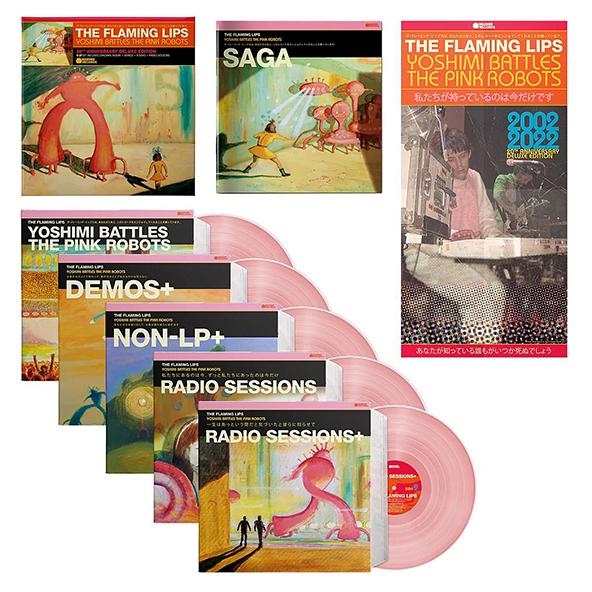
Mike Mettler: How important is it to you that, now that we’re 20 years down the line from the initial release of Yoshimi Battles the Pink Robots, we have such a rich vinyl box set collection to show for it?
Wayne Coyne: Well, in the beginning, I always think, “Oh, I don’t wanna revisit all these things.” But then, once we do, I really like it. There are always new things to find out, and there are always little tweaks you can do.
And if you’re old enough, vinyl is still the format you remember how you were hearing records when you were five years old. My older brothers and my mother, we didn’t have very many records when I was young. We had the few Tom Jones records my mother loved and a couple of The Beatles records, and we played them until they were absolutely gray slabs — so scratched, and so used.
Mettler: Some people might forget or may not even realize it, but you could wear down a record like that. If you played any record long enough, it would wear out.
Coyne: Yeah! And we just had cheap little players back then. We didn’t have any of the hi-fi stuff yet, so we had the cheapest stuff — you know, big needles like the size of a nail that you’d put your house up with. (both laugh)
For me personally, I just got used to hearing records slightly more distorted and slightly scratchy, so I think by the time CDs came along and vinyl was no longer [as prominent], we started to insert distortion and scratches into our music because we always thought that’s the way music sounded. (laughs)
Mettler: I always thought that might have been the case, because you would play with certain, I wanna say, warbly factors of your voice, or the way some of the effects going on behind you in a mix made me think of how records were in the early days of transitioning to higher-fidelity recordings. You can hear the evolution of some of those kinds of choices you guys made on the demos that are on the Demos+ LP of the Yoshimi box set [LP2, Sides 3 and 4]. I love hearing the development of some of that material in this way, because I know you guys were transitioning from drums to drum machines a little bit more at that point too.
Coyne: Well, I think part of our desire was not to spend 3 days getting a snare-drum sound, you know? That might be exaggerating it a little bit. We were in the middle of working with Dave Fridmann at his studio [Tarbox Road Studios, located in upstate Western New York], where we had been recording with him for about 5 or 6 years at that point.
Steven [Drozd, The Flaming Lips’ multi-instrumentalist/drummer and Coyne’s main creative co-conspirator in the band] and I were trying to not record as many drums — even though, in the end, we ended up recording as much as we always do. But in the beginning, we were messing around more with his bank of samplers, and we were using more drum machines. It was just a way for us to get out of doing all that, like, “Well, it already sounds good. Why do we have to record drums for 3 days?” (laughs heartily) But then we ended up doing that anyway, you know?
Revisiting all those demos now, for this box set — I think when you know the final version [of a song], hearing the demo sometimes is absolutely amazing. You’re like (exclaims), “What? Wow!”

Mettler: Did you and Steven share any QC notes with Dave Fridmann when you were working on the vinyl for this collection?
Coyne: Well, Dave, he really does all that mastering. He’s got a system where he’s gonna listen to all the test pressings — and he’s pretty picky about those. In these days of Covid, everybody’s vinyl is backed up 6 months already — but he’ll still send it back and say, “Nope, you gotta do it again.”
He’s always on top of that. It’s rare that there’s gonna be a disaster, because when we’re making the masters, no matter what we’re doing, he’s already a couple steps ahead of knowing all the song lengths, and how much time is gonna go on a side. He’ll easily make it all work for the vinyl sides.
While we’re making these things, Dave’s already five steps ahead of knowing, “That volume won’t work on a vinyl, but it’ll work in digital,” and all that. He’s definitely got good ears. I’m just not patient in that way. I’m like, “It sounds f---ing good. Let’s move on!” (laughs) But I’m glad it sounds amazing.
And once an album is made, I wouldn’t wanna change the order. I mean, we would remaster something, but we wouldn’t remix. We wouldn’t change it per se, you know? Sometimes, we’re reluctant that we have to make double albums instead of a single because it’s just more vinyl and it’s more money, and all that. But to me, the music always comes first — and everything else, we can fix.
I think the Yoshimi Battles the Pink Robots record is just such a great-sounding record, with all the little details. And we spent a lot — a lot — of time punishing it, to a certain extent, to get it like that. We wouldn’t wanna make every record like that. Those records are hard to make, the ones where you keep going and keep pounding away, you know? Though I’m very glad we make records like that, I’m glad not all of our records are that intense.
Mettler: Specifically with the version of “Do You Realize??” that’s at the outset of the second side of the Demos+ LP, where we hear that false start and then you just keep going — you remind me of John Lennon there, just working through it. It’s almost like listening to that Beatles level of Anthology archaeology, because “Realize??” turned into such a magical thing, especially after it got into the public consciousness.
Coyne: I don’t know why “realize” became a word we would use in songs, but there were a couple of other songs we had used it in, and I remember Steven and I thinking, “We should just turn this into a song where realize is part of the whole idea.” It’s easy to say, but you don’t really know what’s gonna come of it.
Mettler: So, in effect, you did realize. You can actually say that now. That was the thing you did get to realize.
Coyne: (laughs heartily) Well, I think the great thing about that word realize is like, “I didn’t learn it. I didn’t understand it. I realize it” — which is different. It’s like, “Oh, I was thinking something else, but really, I found this to be true” — which is the best way, because then your ego and everything doesn’t get in the way, and you really get to know something.
And, yes, you can hear it on the demo [the one called “1st Chords Wayne”] where I kind of had the idea. I’m sure Steven showed me a chord sequence, and I think I’m doing that sequence, but I don’t get it right because I can tell Steven’s like, “You’re not using that chord, or that chord, or that chord.” But it was working enough for me to tell my little four-line story — and I’m sort of making those up as I go on there.
That’s really how everybody does it. I mean, I think every songwriter, in a way, writes songs like that. Part of you is like you’re just hypnotized, and you’re just speaking in tongues or something, you know?
Mettler: “Are You a Hypnotist,” you could even say. [This is a reference to the track “Are You a Hypnotist,” which appears as Track 4 on Side 2 of the original Yoshimi album.]
Coyne: Yeah — yeah! (laughs heartily) But sometimes, that really is where lyrics come from, in a song. To me, I’m not writing them and thinking they’re great. When you sing them and they work, that’s different than just writing them. As clunky as that demo is, that’s just how you make ’em.
Mettler: Again, it reminds me of some of those late-period John Lennon demos, like how you hear “Free as a Bird” sounding almost like it was made underwater — but it doesn’t matter because the content is ultimately more important as to what it started out as.
Coyne: Right. And when I’m playing that “Realize??” demo for Steven, he’s either gonna get it, or he’s not. And then once we’ve refined it a little bit, we’re gonna play that for Dave Fridmann, and he’s either gonna get it, or not. Those are the markers. Once Steven reacted to it, that said to me, “Well, let’s work on it a little bit more. Let’s see where it can go.”
There’s no way you can know what a song is going to become once it’s out there in the world, you know? I think we were happy enough with it, and we were glad to be working on something that was working. But it wouldn’t have been (affects adamant tone), “This one is different and more special than the others!” (resumes normal tone) It was another song we were glad to be working on, and it worked great — and we moved on to the next song, though I don’t even remember what the next one was. (chuckles)
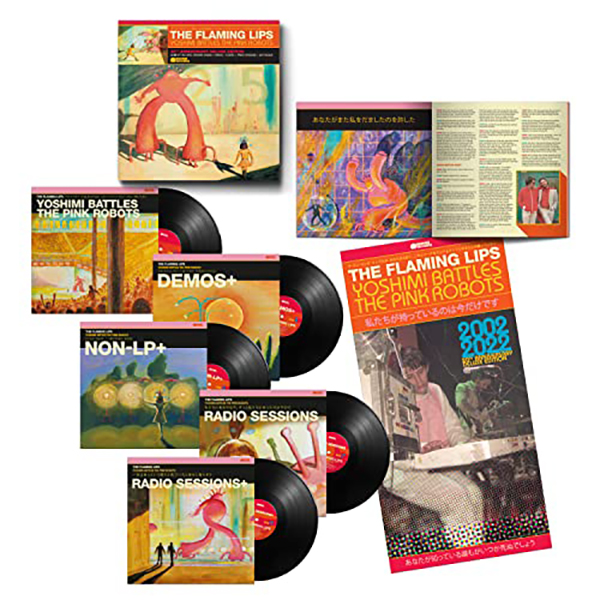
Mettler: I think the Yoshimi sequencing is also worth noting here. When we’re listening to Yoshimi on vinyl, I feel like everything fits on the sides you have them on. Is that due to instinct? Do you just know you’ve gotta start Side 1 in the “Fight Test” universe, and then follow it with the end game of the Yoshimi battle right after that? Does it come to you that logically?
Coyne: No! No. I mean, I wish there was a way that you could say, “Hey, we know that order’s gonna work.” No. It’s just the way you feel at the time, and you hope it works.
But we know, even from our own experience of listening to records, once you listen to something 20 times, 30 times, 500 times — it makes its own groove in your brain, and it doesn’t even feel like it could be any different. It seems exactly perfect. Records I’ve listened to 50 billion times, like a Led Zeppelin record — I couldn’t even imagine that being in a different order. But then they put out compilations and things like that — and after a while, you get used to it. You don’t think about it.
When you’re putting your own record together — I mean, the way we do it, anyway — we care. You like to think this order works. Steven [Drozd] is aware of what keys the songs are in, and that gets taken into account. Steven can tell, “This is nice. It’s going from this key to that key.” Or, “They’re in the same key, but then it switches later.” All those things come into it.
Mettler: I get it — and sometimes, you’re just going by instinct. To get back to “Fight Test” for a moment, did you know you were gonna use a megaphone at the literal beginning of it, and later at the end where you have the perfect line, “The test is over!” where you have that certain echo to it, and those other effects? Did that come early on, or did it happen when you were in the middle of working on it?
Coyne: Well, first, once we knew that the album was gonna be called Yoshimi Battles the Pink Robots — we stumbled upon that, probably, when we were three-quarters of the way done with the album, but we still didn’t really know, “What is all this? What is all this about?”
Once we stumbled upon the song that ends up on the album being called “Yoshimi Battles the Pink Robots Part 2” [Track 4 on Side 1] — we didn’t have the first one, but we had the second one, the instrumental that sounds like he’s battling a robot. Dave Fridmann and I said that to each other — “It sounds like he’s battling a robot.” And he was like, “Well, that should be what it’s called.” “You’re right!” And I called it a robot because, well — we’re The Flaming Lips, or whatever. (both laugh)
That started us just saying, “Oh, okay, now we know what to do.” And then we quickly wrote “One More Robot” [Track 2 on Side 1], because we knew that would tie into the whole Yoshimi Battles the Pink Robots idea. We already had a song we made into the “Yoshimi Battles the Pink Robots Part 1” song [Track 3 on Side 1]. And then we still needed another song that sort of hinted at the philosophical divide of what’s gonna happen there — and that gave us the “Fight Test.”
Now, the demo tapes I was working with for the album are tapes I’d had for a long, long time. When I did the parking lot experiments back in 1996 [whereupon Coyne gave out hundreds of cassettes he had made to fans and car-show attendees to all play simultaneously together on their car stereos], many of the tapes would be test tapes. I made these tapes myself, and on them I would say, “The test begins now.”
When I would put them on tape, I had 50 little cassette players in my room. They were all plugged into a six strip, and I could get them all to turn on at the same time. I wanted them all to say, “The test begins now” in order. The first one would say it first and the second one would say it next, but that would be all that was on the tape. It would just say, “The test begins now,” and “The test is over now.”
I would grab these tapes a couple years later, and I’d just record on them again. Sometimes, at the beginning of it, it would say, “The test begins now,” and then I’d think, “Oh, I’m just gonna do my song anyway,” and that would be at the end of it. I’d play the tapes for Dave Fridmann and say, “It has the tests on here, but let’s not worry about it.” He’s like, “F--- that — that makes the song!”
Even when we were getting some of the demos together for this big box set, I was still going through these tapes, and in the middle of them, it’s (adopts foreboding tone), “The test is over now!” There are 300 versions of me saying that. Some of ’em are sped up, some of ’em are slowed down.
Mettler: At no point are you worried about sharing these intimate moments with the rest of the world? Or are you like, “I’m just putting my entire thought process out there.” Even with the volume of material we have here on this box set, you never stepped back and said, “I don’t know if I can share that”?
Coyne: No. I mean, it’s slightly embarrassing, but you get over that. It’s revealing, it’s cool, and it’s the truth — and it’s real.
And like you said, when you hear those Beatles demos — and I’m not comparing us to the Beatles at all — but there are not very many bands that have demos where the final song is so different. I love hearing the idea of, “That’s them working through the song.” I think it’s inspiring to think you can get that. It doesn’t take a studio to get there. You just have to sit there, and be trying. If you get lucky, something could happen, and it can turn into this other big thing. That’s very inspiring, I think.
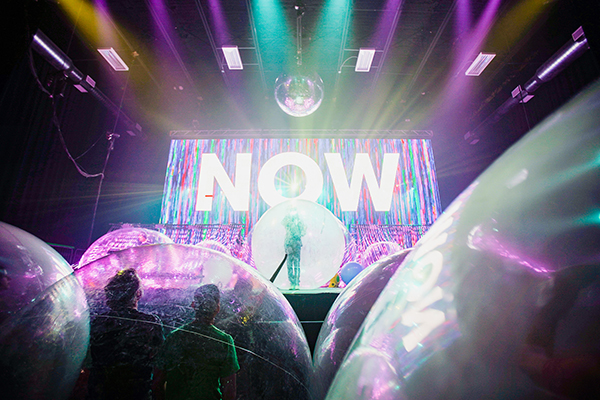
Mettler: I know we’re running out of time, so let me give you the theoretical final cue that projects us all 50 years into the future. Unless some weird science bubble keeps us alive, probably you and I are not physically on the planet at that point, unless, again, science. (Coyne laughs) So, however people listen to music in 2073, and they type “The Flaming Lips” into whatever their listening devices are, what do you want them to get outta that experience?
Coyne: Ohh! Well, it would be the same thing everybody’s always had. I mean, if a song touches you, it’s a great song. It doesn’t matter whoever it is — if it’s The Beatles or it’s Britney Spears, it doesn’t matter.
And the other part of that is true — if a song doesn’t move you, it’s not a great song. To me, it’s like food. If you like frozen pizza and you think that’s great, then it’s great. Someone can’t tell you it’s not great, you know?
Music’s main joy is that it can penetrate you like nothing else can. Lots of great music is out there. Music, when it reaches you, it’s emotion, it’s memory, it’s you, it’s your life — it’s everything all at once, and it’s all happening within just a couple of seconds. It’s amazing.
I can’t imagine the human experience, from now on, needs to get too much better than this. We have music anytime we want it. And with a song everybody’s been listening to for a long time, it’s almost like the more people listen to it, the more you want to hear it. I wouldn’t have thought I would be 62 years old and still get a thrill from hearing The Beatles doing “Hey Jude” — but I do! Because it goes deeper and deeper into you. Your life is still going. Your life is bigger, and the song is bigger. And the more people like it, the more it allows more people to like it, and to feel it.
I think that’s why music is so great, because you can feel it, and see it, and behold it. It’s just in your imagination. It’s just in your mind — which is better, you know? It’s more you that way, because part of you has to be shut off. I think people forget this. Intense listening means part of you isn’t there — and a lot of other things aren’t like that. That’s the magic of listening — it really is. It’s not even the magic of music. It’s the magic of listening and being, because it’s amazing. And it can always be amazing.
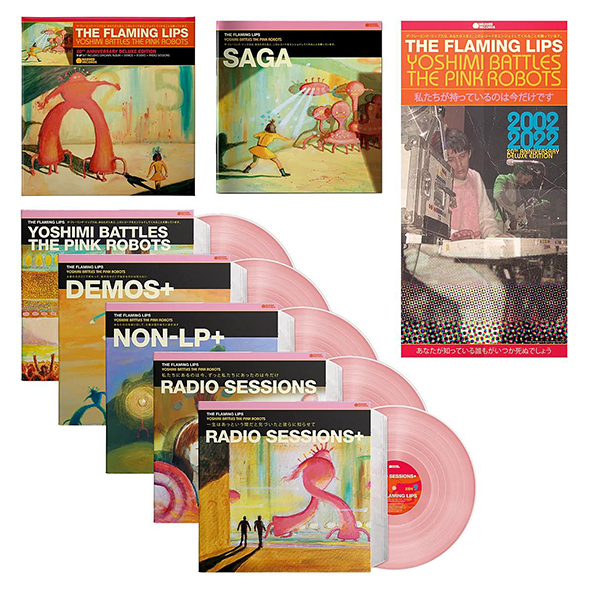
THE FLAMING LIPS
YOSHIMI BATTLES THE PINK ROBOTS
20TH ANNIVERSARY DELUXE EDITION
180g 5LP (Warner Records)
LP 1 – ORIGINAL ALBUM
Side 1
1. Fight Test
2. One More Robot/Sympathy 3000-21
3. Yoshimi Battles The Pink Robots Part 1
4. Yoshimi Battles The Pink Robots Part 2
5. In The Morning Of The Magicians
Side 2
1. Ego Tripping At The Gates of Hell
2. Are You A Hypnotist
3. It’s Summertime
4. Do You Realize??
5. All We Have Is Now
6. Approaching Pavonis Mons By Balloon
LP 2 – DEMOS+
Side 3
1. All My Life - Morning Of The Magicians (Demo)
2. Ego Tripping Part 2 or 3 (Demo)
3. Yoshimi Battles The Pink Robots (Demo)
4. Hypnotist: Early Version (Demo)
5. Epic Systems Delirium (Demo)
6. In The Morning Of The Magicians (Demo)
Side 4
1. Do You Realize?? 1st Chords Wayne (Demo)
2. Do You Realize?? Steven New Part (Demo)
3. Fight Test: Primitive Demo With Helium Voice
4. If I Go Mad/Funeral In My Head (B-Side of Do You Realize?? UK CD 1)
5. Syrtis Major (B-Side of Do You Realize?? UK CD 1)
LP 3 – NON-LP+
Side 5
1. Yoshimi Battles The Pink Robots (Japanese Version)
2. SpongeBob & Patrick Confront The Psychic Wall Of Energy (From The SpongeBob SquarePants Movie)
3. Seven Nation Army (From LateNightTales: The Flaming Lips)
4. Go (Sparklehorse with The Flaming Lips) (Alternate Version From the Flaming Lips Archives)
5. The Deterioration Of The Fight Or Flight Response (B-Side of Fight Test UK CD 1)
6. Fight Test (Live on WXRT)
Side 6
1. Do You Realize?? (Live on CD 101)
2. Yoshimi Battles The Pink Robots (AOL Session)
3. Waitin' For A Superman (Live on WXPN)
4. In The Morning Of The Magicians (Live on KCRW)
5. White Christmas (Live on WXPN)
6. The Golden Path (The Chemical Brothers, feat. The Flaming Lips)
LP 4 – RADIO SESSIONS
Side 7
1. Suspicious Minds (Live on Cover-ed)
2. Assassination Of The Sun (Live on BBC Radio 1) Maida Vale Session July 2002
3. Can't Get You Out Of My Head (Live on BBC Radio 1) Maida Vale Session July 2002
4. Do You Realize?? (Live on BBC Radio 1) Maida Vale Session July 2002
5. One More Robot (Live on BBC Radio 1) Maida Vale Session July 2002
Side 8
1. Do You Realize?? (Live on KEXP) Aug 5, 2002
2. One More Robot (Live on KEXP) Aug 5, 2002
3. Can't Get You Out Of My Head (Live on KEXP) Aug 5, 2002
4. Yoshimi Battles The Pink Robots (Live on KEXP) Aug 5, 2002
5. Breathe (Live on XFM) June 26 2003
6. Ego Tripping At The Gates of Hell (Live on XFM) Nov 11, 2003
7. Sunship Balloons (Live on XFM) Nov 11, 2003
LP 5 – RADIO SESSIONS+
Side 9
1. Fight Test (Live on XFM) June 26 2003
2. Thank You Jack White (Live on XFM) June 26 2003
3. Do You Realize?? (Live on XFM) July 11, 2002
4. One More Robot (Live on XFM) July 11, 2002
5. Can't Get You Out Of My Head (Live on XFM) July 11, 200
Side 10
1. Ego Tripping At The Gates of Hell (Live on BBC Radio 1) Oct 31, 2003 BBC Janice Long Show
1. Yoshimi Battles The Pink Robots (Live on BBC Radio 1) Oct 31, 2003 BBC Janice Long Show
2. Sunship Balloons (Live on BBC Radio 1) Oct 31, 2003 BBC Janice Long Show
3. Up Above The Daily Hum (B-Side of Do You Realize?? UK CD 2)
4. Xanthe Terra (B-Side of Do You Realize?? UK CD 2)
